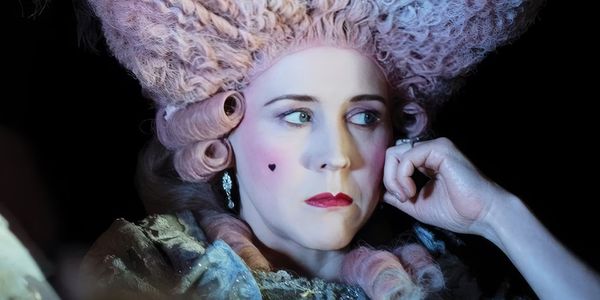Eye For Film >> Movies >> Timestalker (2024) Film Review
Timestalker
Reviewed by: Amber Wilkinson

If you’re interested in the idea of toxic relationship cycles that repeat themselves but thought Betrand Bonello’s The Beast rather lumbering and arthouse, then you might find Alice Lowe’s Timestalker hits the spot. In it she tackles the same topic with considerably more comedic snap and crackle not to mention a fair amount of electropop.
We meet Lowe’s Agnes first in 1688 Scotland, along with a small coterie of other characters who we will go on to re-encounter in subsequent centuries. Appropriately, and in a move that shows Lowe can be subtle and in your face simultaneously, this has become known as The Killing Time in Scotland, marking a conflict between the Covenanter movement and the government. Spinster Meg is heading out for a jolly day at an execution when, just moments before she meets the first of her own sticky ends, she falls hook, line and sinker for dashing heretic preacher Alex (Aneurin Barnard, twinkly). “I will find you,” she tells him and she’s true to her word.
With no hanging about, we’re in England in 1793, where Meg is now a rich, bored and put-upon wife. Her dog, George, has been reincarnated too, as her bestial husband (Nick Frost), his every action accompanied by snarling sound design from Martin Pavey, and whose love for her is no less toxic than her infatuation for Alex. George too, is infatuated - “I will hunt you down till the end of time,” he tells her. Barnard’s character is a highwayman this time around, like his earlier incarnation, he wants to bask in adulation but is also a total coward.
Lowe’s approach is an exhiliarating, if sometimes a bit scrappy, mix of high and low brow. Agnes isn’t just falling for Alex through time but also prat-falling through it. Viz-style jokes abound, quite a few involving a wooden dildo, and there are plenty of nods to Eighties films and pop videos, particularly in the film’s generally gauzily shot style. At the same time, we’re encouraged to increasingly see past the notion of infatuation as something desirable and come to view the stalkerish qualities indicated by the film’s title.
At the highbrow end, as with The Killing Time, this second incarnation of Agnes happens in the year of France's Reign of Terror and during the Enlightenment, appropriate for pennies of truth that start to drop for her in this period. She’s nudged to take a wider view of her predicament by Scipio (Jacob Anderson), who seems to know a lot more about what’s going on than a single lifetime warrants.
Agnes’ jumps through time are accompanied by a sort of riffling deck of images from various lives - including her looking like Cleopatra, which fuels an enjoyable running joke. The second extended stay with our heroine is in 1980, however, when with a perm and attitude, she goes into full stalker mode in pursuit of this lifetime’s Alex, now a New Romantic pop star who may well be on the outs. The score from Toydrum comes into its own here with a wonderful pastiche of his Spandau-Ballet-esque ‘big hit’. In this period, Lowe also takes potshots at the period’s brand of “feminism”. “I’d rather be a slave than a lesbian,” she tells her mate Meg (Tanya Reynolds, whose character’s repeated love down the ages may be the purest of those on display)
It may take a few lifetimes but Agnes inches towards an epiphany of sorts as Lowe continues to play around with romantic ideals and tropes - although a pretty lovebird can be just as easily crushed as set free. As the film becomes more about soul-searching than soulmates, Lowe never misses an opportunity to work in a punchline and makes us fall in love with Agnes, no matter what her faults.
The film had its UK premiere at EIFF and is out in UK cinemas on October 18.
Reviewed on: 20 Aug 2024
















